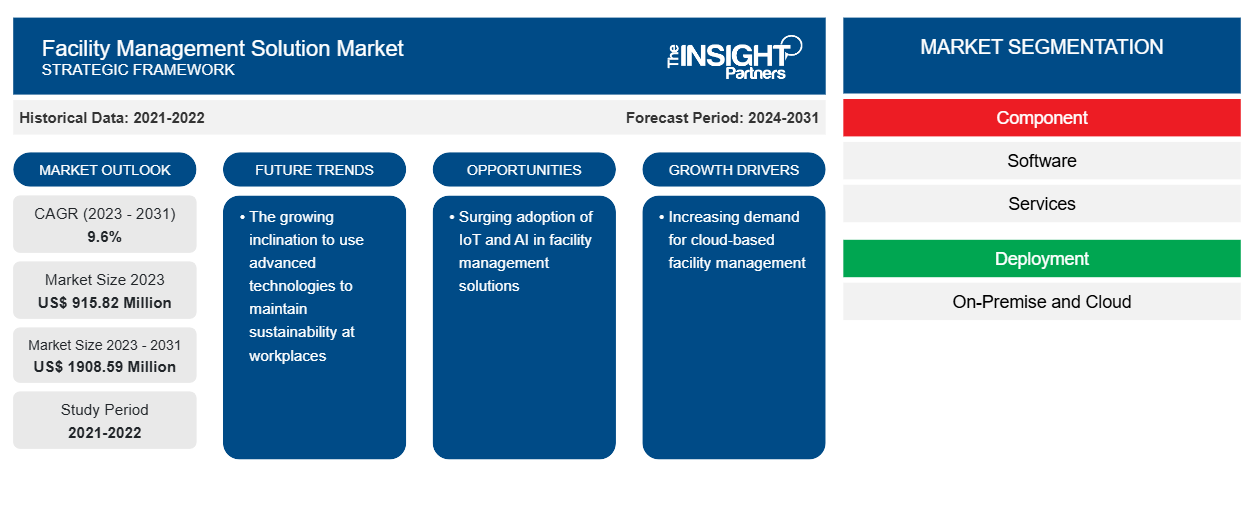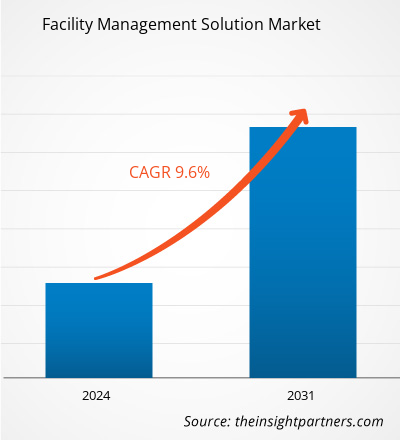Facility Management Solution Market Trends and Analysis by 2031
Facility Management Solution Market Size and Forecast (2021 - 2031), Global and Regional Share, Trend, and Growth Opportunity Analysis Report Coverage: By Component (Software and Services); Deployment (On-Premise and Cloud); Enterprise Size (Large Enterprises and SMEs); Application (BFSI, Retail, Transport and Logistics, Pharmaceuticals, Government, IT and Telecom, Manufacturing, and Others), and Geography
Historic Data: 2021-2022 | Base Year: 2023 | Forecast Period: 2024-2031- Report Date : Mar 2026
- Report Code : TIPRE00026519
- Category : Technology, Media and Telecommunications
- Status : Data Released
- Available Report Formats :


- No. of Pages : 150
The facility management solution market size is projected to reach US$ 1908.59 million by 2031 from US$ 915.82 million in 2023. The market is expected to register a CAGR of 9.6% during 2023–2031. Increasing demand for cloud-based facility management solutions and surging adoption of IoT and AI in facility management solutions are likely to remain key trends in the market.
Facility Management Solution Market Analysis
The adoption of facility management solutions results in labour and energy cost reduction. Therefore, several businesses and organizations across industries such as BFSI, Retail, transport and logistics, pharmaceuticals, government, IT and telecom, manufacturing, and others are adopting this solution that fosters its market growth globally.
Facility Management Solution Market Overview
Facilities management utilizes tools and services to ensure the operational effectiveness, safety, and environmental sustainability of buildings, infrastructure, and real estate. The solution focuses on supporting individuals and organizations by ensuring that the built environment, including the buildings and surrounding infrastructure, offers optimal functionality, comfort, safety, sustainability, and efficiency. The primary goal of facility management is to integrate people, places, and processes within the built environment to enhance the quality of life for occupants and improve the productivity of the core business operations. Organizations can create a conducive environment that promotes well-being, productivity, and success by effectively managing facilities.
Customize This Report To Suit Your Requirement
Get FREE CUSTOMIZATIONFacility Management Solution Market: Strategic Insights

-
Get Top Key Market Trends of this report.This FREE sample will include data analysis, ranging from market trends to estimates and forecasts.
Facility Management Solution Market Drivers and Opportunities
Growing construction industry
Growing urbanization and population are the major factors driving the commercial, residential, and industrial infrastructures. The benefits of digitalization in the construction industry have encouraged its market players to adopt software solutions to efficiently manage their business operations and workflow. The adoption of facility management solutions in the construction industry can help the market players maintain and manage the new infrastructure efficiently. The features of software such as preventive maintenance, space management, and others can also help to build the new infrastructure efficiently. Thus, the growing construction industry can create lucrative opportunities for the facility management solution market.
Demand for cloud-based solutions.
The scalability and flexibility offered by cloud solutions are leading to the adoption of the cloud-based facility management solution market. Cloud-based cost-effective solution helps organizations to handle their facilities and assets. It offers improved data management capabilities by centralizing storage and management in the cloud. Various market players are providing cloud-based facility management solutions to cater to the demand for cloud-based solutions. For example, QuickFMS provides cloud-based facility management software that enables the organization to manage and track maintenance requests, schedule preventive maintenance, manage inventory, track assets, monitor energy consumption, and more.
Facility Management Solution Market Report Segmentation Analysis
Key segments that contributed to the derivation of the facility management solution market analysis are the component, deployment, enterprise size, and application.
- Based on the component, the facility management solution market is segmented into software and services. The software segment held the largest share of the market in 2023.
- By deployment, the market is segmented into on-premise and cloud. The cloud segment is expected to grow with the highest CAGR.
- Based on the enterprise size, the facility management solution market is segmented into large enterprises and SMEs. The large enterprises segment is expected to grow with the highest CAGR.
- By application, the market is segmented into BFSI, retail, transport and logistics, pharmaceuticals, government, IT and telecom, manufacturing, and others. The IT and telecom segment held a significant share of the market in 2023.
Facility Management Solution Market Share Analysis by Geography
The geographic scope of the facility management solution market report is mainly divided into five regions: North America, Asia Pacific, Europe, Middle East & Africa, and South & Central America.
Asia Pacific region held the largest market share and is expected to grow with the highest CAGR. The growing digitalization and rise in the adoption of software solutions are driving market growth. The growing digitalization among SMEs and the need for efficient facility management are some of the major driving factors of the facility management solution market.
Facility Management Solution Market Regional Insights
The regional trends and factors influencing the Facility Management Solution Market throughout the forecast period have been thoroughly explained by the analysts at The Insight Partners. This section also discusses Facility Management Solution Market segments and geography across North America, Europe, Asia Pacific, Middle East and Africa, and South and Central America.
Facility Management Solution Market Report Scope
| Report Attribute | Details |
|---|---|
| Market size in 2023 | US$ 915.82 Million |
| Market Size by 2031 | US$ 1908.59 Million |
| Global CAGR (2023 - 2031) | 9.6% |
| Historical Data | 2021-2022 |
| Forecast period | 2024-2031 |
| Segments Covered |
By Component
|
| Regions and Countries Covered |
North America
|
| Market leaders and key company profiles |
|
Facility Management Solution Market Players Density: Understanding Its Impact on Business Dynamics
The Facility Management Solution Market is growing rapidly, driven by increasing end-user demand due to factors such as evolving consumer preferences, technological advancements, and greater awareness of the product's benefits. As demand rises, businesses are expanding their offerings, innovating to meet consumer needs, and capitalizing on emerging trends, which further fuels market growth.

- Get the Facility Management Solution Market top key players overview
Facility Management Solution Market News and Recent Developments
The facility management solution market is evaluated by gathering qualitative and quantitative data post primary and secondary research, which includes important corporate publications, association data, and databases. A few of the developments in the facility management solution market are listed below:
- Facility Vitals, a prominent provider of facility management solutions, announced the release of its innovative software solution, which promises to revolutionize the way facility managers handle their operations. The company's new software was designed to simplify facility management, providing facility managers with the tools they need to manage their facilities more efficiently and effectively. (Source: Newsfile Corp, Press Release, March 2023)
Facility Management Solution Market Report Coverage and Deliverables
The "Facility Management Solution Market Size and Forecast (2021–2031)" report provides a detailed analysis of the market covering below areas:
- Facility management solution market size and forecast at global, regional, and country levels for all the key market segments covered under the scope
- Facility management solution market trends, as well as market dynamics such as drivers, restraints, and key opportunities
- Detailed PEST/Porter's Five Forces and SWOT analysis
- Facility management solution market analysis covering key market trends, global and regional framework, major players, regulations, and recent market developments
- Industry landscape and competition analysis covering market concentration, heat map analysis, prominent players, and recent developments for the facility management solution market
- Detailed company profiles
Frequently Asked Questions
Ankita is a dynamic market research and consulting professional with over 8 years of experience across the technology, media, ICT, and electronics & semiconductor sectors. She has successfully led and delivered 100+ consulting and research assignments for global clients such as Microsoft, Oracle, NEC Corporation, SAP, KPMG, and Expeditors International. Her core competencies include market assessment, data analysis, forecasting, strategy formulation, competitive intelligence, and report writing.
Ankita is adept at handling complete project cycles—from pre-sales proposal design and client discussions to post-sales delivery of actionable insights. She is skilled in managing cross-functional teams, structuring complex research modules, and aligning solutions with client-specific business goals. Her excellent communication, leadership, and presentation abilities have enabled her to consistently deliver value-driven outcomes in fast-paced and evolving market environments.
- Historical Analysis (2 Years), Base Year, Forecast (7 Years) with CAGR
- PEST and SWOT Analysis
- Market Size Value / Volume - Global, Regional, Country
- Industry and Competitive Landscape
- Excel Dataset
Recent Reports
Related Reports
Testimonials
The Insight Partners' SCADA System Market report is comprehensive, with valuable insights on current trends and future forecasts. The team was highly professional, responsive, and supportive throughout. We are very satisfied and highly recommend their services.
RAN KEDEM Partner, Reali Technologies LTDsI requested a report on a very specific software market and the team produced the report in a few days. The information was very relevant and well presented. I then requested some changes and additions to the report. The team was again very responsive and I got the final report in less than a week.
JEAN-HERVE JENN Chairman, Future AnalyticaWe worked with The Insight Partners for an important market study and forecast. They gave us clear insights into opportunities and risks, which helped shape our plans. Their research was easy to use and based on solid data. It helped us make smart, confident decisions. We highly recommend them.
PIYUSH NAGPAL Sr. Vice President, High Beam GlobalThe Insight Partners delivered insightful, well-structured market research with strong domain expertise. Their team was professional and responsive throughout. The user-friendly website made accessing industry reports seamless. We highly recommend them for reliable, high-quality research services
YUKIHIKO ADACHI CEO, Deep Blue, LLC.This is the first time I have purchased a market report from The Insight Partners.While I was unsure at first, I visited their web site and felt more comfortable to take the risk and purchase a market report.I am completely satisfied with the quality of the report and customer service. I had several questions and comments with the initial report, but after a couple of dialogs over email with their analyst I believe I have a report that I can use as input to our strategic planning process.Thank you so much for taking the extra time and making this a positive experience.I will definitely recommend your service to others and you will be my first call when we need further market data.
JOHN SUZUKI President and Chief Executive Officer, Board Director, BK TechnologiesI wish to appreciate your support and the professionalism you displayed in the course of attending to my request for information regarding to infectious disease IVD market in Nigeria. I appreciate your patience, your guidance, and the fact that you were willing to offer a discount, which eventually made it possible for us to close a deal. I look forward to engaging The Insight Partners in the future, all thanks to the impression you have created in me as a result of this first encounter.
DR CHIJIOKE ONYIA MANAGING DIRECTOR, PineCrest Healthcare Ltd.Reason to Buy
- Informed Decision-Making
- Understanding Market Dynamics
- Competitive Analysis
- Identifying Emerging Markets
- Customer Insights
- Market Forecasts
- Risk Mitigation
- Boosting Operational Efficiency
- Strategic Planning
- Investment Justification
- Tracking Industry Innovations
- Aligning with Regulatory Trends




















 Get Free Sample For
Get Free Sample For